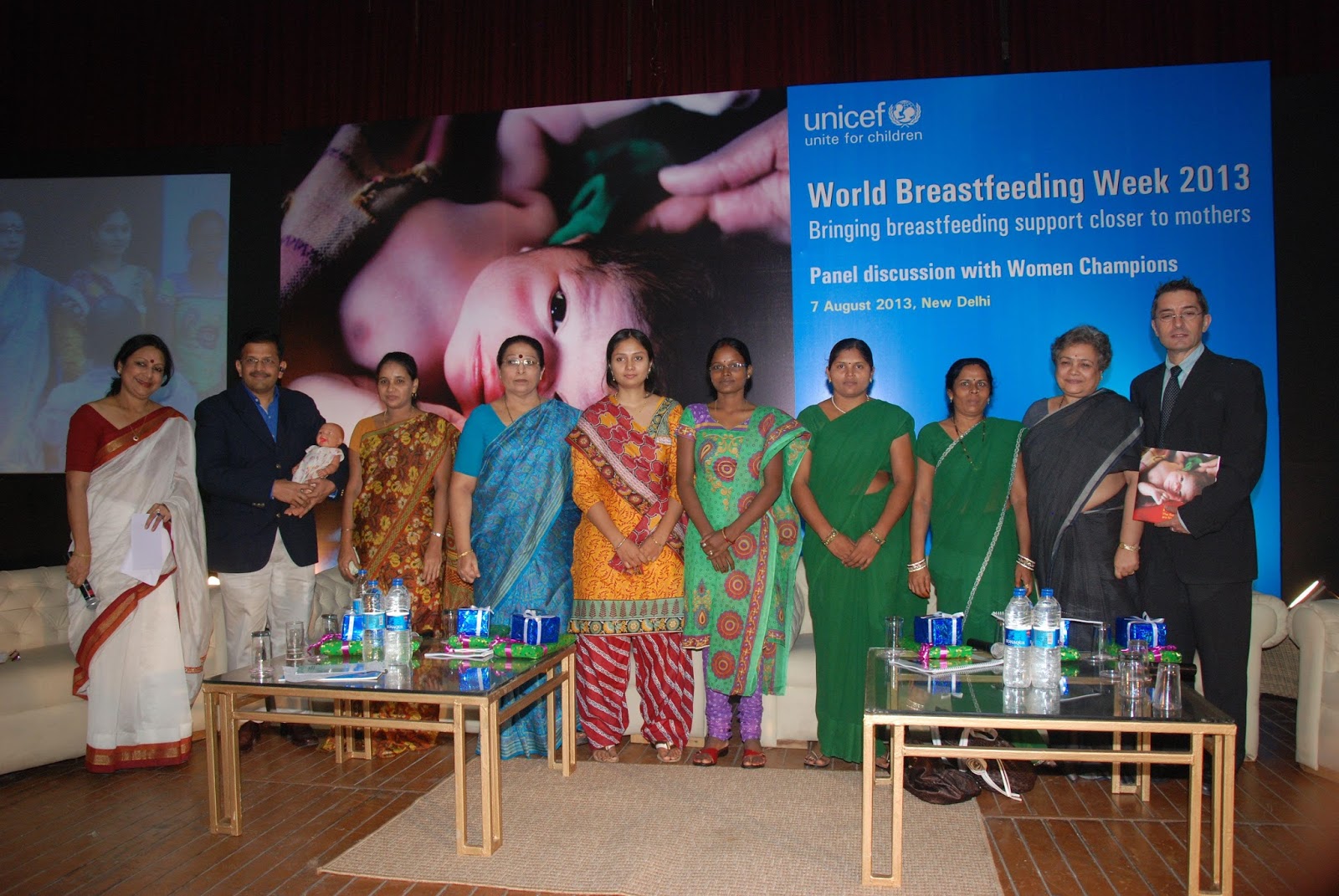Support mothers to breastfeed
NEW DELHI, 7 August 2013 On the occasion of World Breastfeeding Week (1-7 August 2013), UNICEF organised an event to celebrate the work of women from the remotest parts of India, who have been working tirelessly to support mothers in breastfeeding.
The event brought together community champions (members of ᭯ther support groups and frontline health and nutrition workers) from different parts of India to share their experiences with media and technical experts on how they succeeded in their efforts to support mothers to breastfeed at critical times.
Welcoming the 㵮sung women heroes䬠Dr. Victor Aguayo, Chief of UNICEF IndiaⳠChild Nutrition and Development Programme said, I congratulate the women champions who have been able to overcome challenges and Reached out to mothers and their families in their homes, their communities, with correct breastfeeding information and support, at times when they needed it most.
In her keynote address, Smt Mrinal Pande, Chairperson, Prasar Bharati said, ㉠am really inspired listening to this group of women who have been able to do so much for their communities amidst such hardships. Given that India has rich traditions, it is always very effective to weave messages around breastfeeding through traditional ceremonies and by involving elders in the family. These women have been able to leverage this effectively
A UNICEF Nutrition Advocacy Toolkit bringing together evidence from UNICEFⳠpolicy programme and communication experience globally and in India was released during the event. The publication builds on the work by the National Coalition for Sustainable Nutrition Security and the Citizens⊁lliance Against Malnutrition and presents a collection of factsheets on essential evidence – based interventions to improve nutrition in children less than two years.
Global evidence shows that starting breastfeeding in the first hour after birth can reduce the risk of newborn death by up to 22 per cent by averting deaths related to sepsis, pneumonia, diarrhea and hypothermia. Evidence also shows that children who are exclusively breastfed are 14 times more likely to survive the first six months of life than non-breastfed children.
Community champions from UP, Gujarat, Madhya Pradesh and Jharkhand shared their experiences on community and facility based counselling, reaching the hard to reach populations and use of mass media to take ᢲeastfeeding support closer to mothers⮠
ቊhave prevented more than 100 families from following the traditional practice of giving honey to their newborns immediately after birth. I have been able to convince the families and ensured that every child gets motherⳠfirst milk,䊳aidUzma Arshi Qureshi, a breastfeeding counsellor from Madhya Pradesh. motherⳠmilk is every childⳠright,⠳tates Uzma.
Shobhna Patel, a community mobilizer from remote hamlets of Valsad, Gujarat supports pregnant tribal women with no access to healthcare to abandon age-old myths that are harmful to the health of the mother and the child. Through her repeated visits, she ensures that young mothers stop following practices like feeding the newborn honey or sugar and educates them on the importance of colostrum – motherⳠfirst milk.
㓩 I am a part of the Vasudhara Dairy Cooperative which helps women take care of their cows and get loans, women trust me. Certain practices like washing hands before breastfeeding and feeding the baby half an hour after birth must be followed䬠explains Shobhna.
㓩 I am a part of the Vasudhara Dairy Cooperative which helps women take care of their cows and get loans, women trust me. Certain practices like washing hands before breastfeeding and feeding the baby half an hour after birth must be followed䬠explains Shobhna.
The World Breastfeeding Week event provided an opportunity for members of media, government, civil society and academia to discuss the gravity of the problem of nutrition and recognizing the long-term impact of investing in promoting breastfeeding practices.
The key message was that breastfeeding should be initiated within one hour of birth and children should be exclusively breastfed for the first six months of life. The evidence presented during the event demonstrated that it is achievable through concerted efforts of all stakeholders in planning, counselling and communication.
Global evidence shows that more mothers breastfeed when they receive information, counselling and support in their homes and communities. This also reinforces the importance of frontline workers and mother support groups in helping mothers to breastfeed successfully.
㼢>Breastfeeding is not questioned, but its early initiation and exclusive breastfeeding remains a challenge. The message should be that Breastfeeding is best feeding䬠said Uzma.
Please refer to the following link for the Global Nutrition Report.
About UNICEF
UNICEF works in more than 190 countries and territories to help children survive and thrive, from early childhood through adolescence. The worldⳠlargest provider of vaccines for developing countries, UNICEF supports child health and nutrition, good water and sanitation, quality basic education for all boys and girls, and the protection of children from violence, exploitation and AIDS. UNICEF is funded entirely by the voluntary contributions of individuals, businesses, foundations and governments. For more information about UNICEF and its work visit: <http://www.unicef.org>. Follow us on Twitter andFacebook.
For further information, please contact:
Caroline Den Dulk, Chief Advocacy and communications, e-mail: cdendulk@unicef.org Tel: 91-9818106093
Geetanjali Master, Communication Specialist e-mail: gmaster@unicef.org, Tel: 91 9818105861
Maria Fernandez, Communication Specialist, email: mfernandez@unicef.org, Tel : 91 9958176291
Sonia Sarkar, Communication Officer, email ssarkar@unicef.orgTel: 91-9810170289
